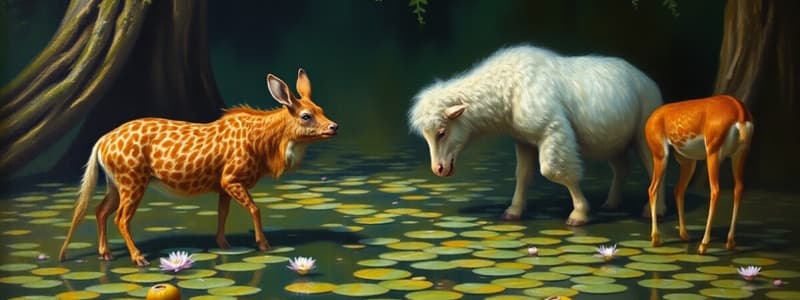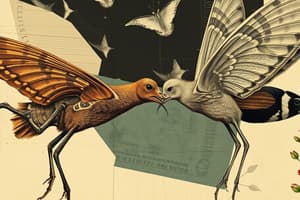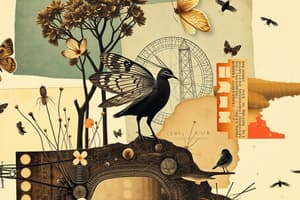Podcast
Questions and Answers
What type of species interaction occurs when one organism benefits while the other is not harmed?
What type of species interaction occurs when one organism benefits while the other is not harmed?
- Commensalism (correct)
- Mutualism
- Predator-Prey
- Parasitism
Which biome is characterized by hot summers, cold winters, and consist mainly of broadleaf trees?
Which biome is characterized by hot summers, cold winters, and consist mainly of broadleaf trees?
- Taiga
- Tropical Rainforest
- Temperate Seasonal Forest (correct)
- Desert
What is a primary importance of freshwater biomes to living organisms?
What is a primary importance of freshwater biomes to living organisms?
- Habitat for coral reefs
- Source of oxygen
- Source of drinking water (correct)
- High biodiversity
Which type of species interaction is exemplified by fleas living on dogs?
Which type of species interaction is exemplified by fleas living on dogs?
In which biome would you expect to find permafrost and a short growing season?
In which biome would you expect to find permafrost and a short growing season?
What environmental characteristic defines a tropical rainforest?
What environmental characteristic defines a tropical rainforest?
Which of the following biomes is NOT a freshwater biome?
Which of the following biomes is NOT a freshwater biome?
What characterizes a shrubland biome?
What characterizes a shrubland biome?
What defines a specialist species in relation to diet and habitat?
What defines a specialist species in relation to diet and habitat?
How do humans contribute to alterations in the carbon cycle?
How do humans contribute to alterations in the carbon cycle?
Which of the following reservoirs is most likely to store carbon for the shortest time?
Which of the following reservoirs is most likely to store carbon for the shortest time?
What process do plants primarily use to convert carbon dioxide into organic matter?
What process do plants primarily use to convert carbon dioxide into organic matter?
Which of the following processes contributes to the long-term storage of carbon?
Which of the following processes contributes to the long-term storage of carbon?
Why are giant pandas more vulnerable to habitat loss compared to golden eagles?
Why are giant pandas more vulnerable to habitat loss compared to golden eagles?
What role do marine organisms play in the carbon cycle?
What role do marine organisms play in the carbon cycle?
Which of the following pairs correctly identifies a generalist and a specialist species?
Which of the following pairs correctly identifies a generalist and a specialist species?
What factors contribute to a higher total fertility rate (TFR)?
What factors contribute to a higher total fertility rate (TFR)?
What characterizes the second stage of the demographic transition model?
What characterizes the second stage of the demographic transition model?
What is the replacement-level fertility in developing countries primarily due to?
What is the replacement-level fertility in developing countries primarily due to?
What is the expected population growth rate with a birth rate of 112 and a death rate of 87 per 1,000 people?
What is the expected population growth rate with a birth rate of 112 and a death rate of 87 per 1,000 people?
What geologic events are expected at a convergent plate boundary?
What geologic events are expected at a convergent plate boundary?
How long will it take a population with a growth rate of 1.3% per year to double in size?
How long will it take a population with a growth rate of 1.3% per year to double in size?
Which stage of demographic transition is characterized by low birth and low death rates?
Which stage of demographic transition is characterized by low birth and low death rates?
What type of plate boundary is characterized by lateral movement with minimal geological activity?
What type of plate boundary is characterized by lateral movement with minimal geological activity?
What characteristics are generally associated with species that experience Type I survivorship curves?
What characteristics are generally associated with species that experience Type I survivorship curves?
Which of the following statements accurately reflects a characteristic of species with a Type III survivorship curve?
Which of the following statements accurately reflects a characteristic of species with a Type III survivorship curve?
What happens to a deer population if the food supply decreases?
What happens to a deer population if the food supply decreases?
How is a stable population depicted in terms of age structure?
How is a stable population depicted in terms of age structure?
What is a key characteristic of an indicator species?
What is a key characteristic of an indicator species?
Which of the following statements about island biogeography is accurate?
Which of the following statements about island biogeography is accurate?
Which demographic measure is described by a broad-based pyramid shape in population age structure?
Which demographic measure is described by a broad-based pyramid shape in population age structure?
Which of the following best describes a species categorized as K-selected?
Which of the following best describes a species categorized as K-selected?
What role do pioneer species play in an ecosystem undergoing primary succession?
What role do pioneer species play in an ecosystem undergoing primary succession?
What happens to biomass and species richness as succession progresses in an ecosystem?
What happens to biomass and species richness as succession progresses in an ecosystem?
What is the implication of a constant loss survivorship curve (Type II)?
What is the implication of a constant loss survivorship curve (Type II)?
What is a potential consequence of a high level of impact by invasive species on a population?
What is a potential consequence of a high level of impact by invasive species on a population?
Why can't an ecosystem maintain normal function if a keystone species is removed?
Why can't an ecosystem maintain normal function if a keystone species is removed?
How do K-selected species typically differ from r-selected species in terms of number of offspring?
How do K-selected species typically differ from r-selected species in terms of number of offspring?
What distinguishes primary succession from secondary succession?
What distinguishes primary succession from secondary succession?
How do K-selected species usually reproduce compared to r-selected species?
How do K-selected species usually reproduce compared to r-selected species?
What are the effects of El Niño on the ocean surface temperature and upwelling?
What are the effects of El Niño on the ocean surface temperature and upwelling?
Which of the following practices contributed to the Green Revolution?
Which of the following practices contributed to the Green Revolution?
What is one major environmental impact of clearcutting?
What is one major environmental impact of clearcutting?
What is a characteristic of La Niña compared to El Niño?
What is a characteristic of La Niña compared to El Niño?
How can over-irrigation negatively affect soil quality?
How can over-irrigation negatively affect soil quality?
What is the primary goal of slash-and-burn farming in tropical regions?
What is the primary goal of slash-and-burn farming in tropical regions?
What is a drawback of Concentrated Animal Feeding Operations (CAFOs)?
What is a drawback of Concentrated Animal Feeding Operations (CAFOs)?
What is meant by the 'tragedy of the commons'?
What is meant by the 'tragedy of the commons'?
Flashcards
Predator-Prey
Predator-Prey
A relationship where one organism (the predator) eats another organism (the prey).
Mutualism
Mutualism
A symbiotic relationship where both organisms benefit from the interaction.
Commensalism
Commensalism
A symbiotic relationship where one organism benefits and the other is neither helped nor harmed.
Parasitism
Parasitism
Signup and view all the flashcards
Tundra
Tundra
Signup and view all the flashcards
Temperate Seasonal Forest
Temperate Seasonal Forest
Signup and view all the flashcards
Tropical Rainforest
Tropical Rainforest
Signup and view all the flashcards
Temperate Grassland
Temperate Grassland
Signup and view all the flashcards
Savanna
Savanna
Signup and view all the flashcards
Photosynthesis
Photosynthesis
Signup and view all the flashcards
Respiration
Respiration
Signup and view all the flashcards
Decomposition
Decomposition
Signup and view all the flashcards
Specialist species
Specialist species
Signup and view all the flashcards
Generalist species
Generalist species
Signup and view all the flashcards
Carbon Compaction
Carbon Compaction
Signup and view all the flashcards
Combustion
Combustion
Signup and view all the flashcards
Total Fertility Rate (TFR)
Total Fertility Rate (TFR)
Signup and view all the flashcards
Infant Mortality Rate (IMR)
Infant Mortality Rate (IMR)
Signup and view all the flashcards
Population Growth Rate
Population Growth Rate
Signup and view all the flashcards
Doubling Time
Doubling Time
Signup and view all the flashcards
Demographic Transition Model
Demographic Transition Model
Signup and view all the flashcards
Convergent Plate Boundary
Convergent Plate Boundary
Signup and view all the flashcards
Divergent Plate Boundary
Divergent Plate Boundary
Signup and view all the flashcards
Transform Plate Boundary
Transform Plate Boundary
Signup and view all the flashcards
Type I Survivorship Curve
Type I Survivorship Curve
Signup and view all the flashcards
Type II Survivorship Curve
Type II Survivorship Curve
Signup and view all the flashcards
Type III Survivorship Curve
Type III Survivorship Curve
Signup and view all the flashcards
Carrying Capacity
Carrying Capacity
Signup and view all the flashcards
Logistic Growth
Logistic Growth
Signup and view all the flashcards
Age Structure Diagram
Age Structure Diagram
Signup and view all the flashcards
Birth Rate
Birth Rate
Signup and view all the flashcards
Death Rate
Death Rate
Signup and view all the flashcards
What is an indicator species?
What is an indicator species?
Signup and view all the flashcards
What is adaptability?
What is adaptability?
Signup and view all the flashcards
How do island size and proximity to mainland affect species diversity?
How do island size and proximity to mainland affect species diversity?
Signup and view all the flashcards
Why do island species become specialists?
Why do island species become specialists?
Signup and view all the flashcards
What is a pioneer species?
What is a pioneer species?
Signup and view all the flashcards
What is the difference between primary and secondary succession?
What is the difference between primary and secondary succession?
Signup and view all the flashcards
Why are keystone species important?
Why are keystone species important?
Signup and view all the flashcards
What is the difference between K-selected and r-selected species?
What is the difference between K-selected and r-selected species?
Signup and view all the flashcards
Commons
Commons
Signup and view all the flashcards
Tragedy of the Commons
Tragedy of the Commons
Signup and view all the flashcards
Ecosystem Services
Ecosystem Services
Signup and view all the flashcards
Clearcutting
Clearcutting
Signup and view all the flashcards
Burning Trees
Burning Trees
Signup and view all the flashcards
Green Revolution
Green Revolution
Signup and view all the flashcards
Intensive Agriculture
Intensive Agriculture
Signup and view all the flashcards
Slash-and-Burn Farming
Slash-and-Burn Farming
Signup and view all the flashcards
Study Notes
Species Interactions
- Predator-Prey: One organism (predator) consumes another (prey). Example: Lion and Zebra
- Mutualism: Symbiotic relationship where both organisms benefit. Example: Bees and Flowers
- Commensalism: Symbiotic relationship where one organism benefits and the other is neither harmed nor helped. Example: Fleas on a dog
- Parasitism: Symbiotic relationship where one organism benefits and the other is harmed. Example: Fleas on a dog
Graph Information
- The graph shows rainfall and temperature.
- A trend of ↓ rainfall and ↑ temperature identifies a desert biome.
Biomes
- Freshwater: Rivers, lakes, streams, ponds, wetlands. Important for drinking water, nutrient cycling
- Marine: Oceans, coral reefs, salt marshes, mangroves, estuaries. Important for carbon sinks, oxygen production
Terrestrial Biomes and Characteristics
- Desert: Hot, dry summers, and cool winters with minimal rainfall. Plants are adapted to low water.
- Savanna: Warm temperatures, seasonal rainfall, grasslands with dispersed trees
- Shrubland: Hot, dry summers, and winters that are cool and moist. Plants are adapted to fire.
- Taiga: Cold, long snowy winters, and short, warm summers. Trees with needles and cones
- Temperate Grassland: Hot, dry summers, and cold, snowy winters. Grasses that re-grow yearly.
- Temperate Rainforest: Warm temperatures, abundant rainfall, large trees, and dense canopy
- Temperate Seasonal Forest: Warm summers, cold winters, seasonal rainfall. Broadleaf trees with deciduous characteristics
- Tropical Rainforest: Warm temperatures, high rainfall, diverse plant life, dense canopy
Carbon Cycle
- Diagram has labels for oceans, atmosphere, plants, sediments, and animals
- Reservoirs with long periods: Sediments and fossil fuels
- Processes that cycle carbon in living organisms: Photosynthesis, Respiration, Decomposition
- How humans alter the carbon cycle: Burning fossil fuels releases carbon, Deforestation alters carbon sinks
Species Generalists and Specialists
- Generalist: A species with a broad diet or tolerance in habitat or environment. Example: Golden eagle
- Specialist: A species with a narrow diet or tolerance of habitat or environments. Example: Giant panda
Invasive Species and Indicator Species
- Specialist species are more likely to be impacted first by an invasive species.
- Indicator species are those that are most susceptible to environmental changes and can help identify changes.
Population Growth
- Humans altering carbon cycle impacts populations.
- Populations vary, growing and shrinking as resources and environmental conditions change
Population Growth Curves
- Type I: Low death rates at early and middle ages, and high death rates near the end of life span. Curve is "convex."
- Type II: Constant death rate at all ages. Curve is "diagonal"
- Type III: High death rates early in life and much lower death rates for the organisms that survive. Curve is "concave."
- Carrying capacity, overshoot, etc, are included in the graph.
- Fewer resources lower capacity.
Demographic Measures
- Total Fertility Rate (TFR): Average number of children a woman will have in her lifetime
- Infant Mortality Rate (IMR): Number of deaths under one year old per 1000 live births
Demographic Transition Model
- Stage 1 (Pre-industrial): High birth rates and high death rates
- Stage 2 (Transitional): High birth rates but lower death rates due to improvements in public health
- Stage 3 (Industrial): Birth rates begin to decline
- Stage 4 (Post-industrial): Low birth and low death rates
Plate Boundaries
- Convergent: Plates collide. Earthquakes, volcanoes, mountain ranges
- Divergent: Plates move apart. Earthquakes, seafloor spreading
- Transform: Plates slide past each other. Earthquakes.
Land and Water Use:
- Tragedy of the Commons: Overuse of a shared resource
- Forests: Provide carbon sinks, prevent soil erosion, improve aeration
- Clearcutting: Removes trees, leads to soil erosion, and increase temperature
- Burning trees: Adds carbon to the atmosphere
- Green Revolution: Increases agricultural efficiency including monoculture, fertilizer, and pesticides
- Water Resources: Water pollution, overgrazing, and unsustainable practices can result in desertification
Soil and Atmosphere
- Organic matter, sand, silt, and clay affect water-holding capacity and permeability
- Layers of the atmosphere: Troposphere, stratosphere, mesosphere, thermosphere, exosphere.
- Solar radiation and Earth's tilt affect temperature distribution.
- Watersheds: Land areas that drain water to a common body.
Irrigation and Urbanization
- Irrigation methods (drip, flood, spray, furrow)
- Impacts of urbanization (resource use, waste production, habitat loss, and pollution)
- Urban sprawl: expansion of cities into surrounding areas
- Impervious surfaces can prevent water from infiltrating soil, increasing run-off
- Negative impact of livestock and overfishing on the environment
- Impacts of different meat production practices
Other Points
- Saltwater intrusion: Movement of salt water into freshwater aquifers in coastal areas when water tables are lowered by overpumping.
Studying That Suits You
Use AI to generate personalized quizzes and flashcards to suit your learning preferences.




